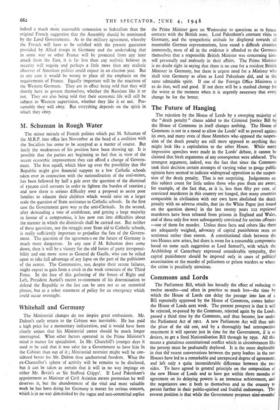Whitehall and Germany
The Ministerial changes do not inspire great enthusiasm. Mr. Dalton's early return to the Cabinet was inevitable. He has paid a high price for a momentary indiscretion, and it would have been clearly unjust that his Ministerial career should be much longer interrupted. What other factors operated in the Prime Minister's mind is matter for speculation. In Mr. Churchill's younger days it used to be said that it was safer for a Government to have him in the Cabinet than out of it ; Ministerial restraint might well be con- sidered better for Mr. Dalton than unchartered freedom. What the ex-Chancellor's sphere of activity will be remains to be disclosed, but it can be taken as certain that it will in no way impinge on either Mr. Bevin's or Sir Stafford Cripps'. If Lord Pakenham's appointment as Minister of Civil Aviation means promotion he well deserves it, but the abandonment of the vital and most valuable work he has been doing for Germany is matter for serious concern, which is in no way diminished by the vague and non-committal replies
the Prime Minister gave on Wednesday to questions as to future contacts with the British zone. Lord Pakenham's constant visits to Germany, and the sympathetic attitude he displayed towards all reasonable German representations, have eased a difficult situation immensely, most of all in the evidence it afforded to the Germans themselves that a responsible British Minister was concerning him- self personally and zealously in their affairs. The Prime Minister is no doubt right in saying that there is no case for a resident British Minister in Germany, but there is urgent need for a Minister who shall visit Germany as often as Lord Pakenham did, and in the same admirable spirit. If one of the Foreign Office Ministers is to do that, well and good. If not there will be a marked change for the worse at the moment when it is urgently necessary that every change be for the better.


































 Previous page
Previous page